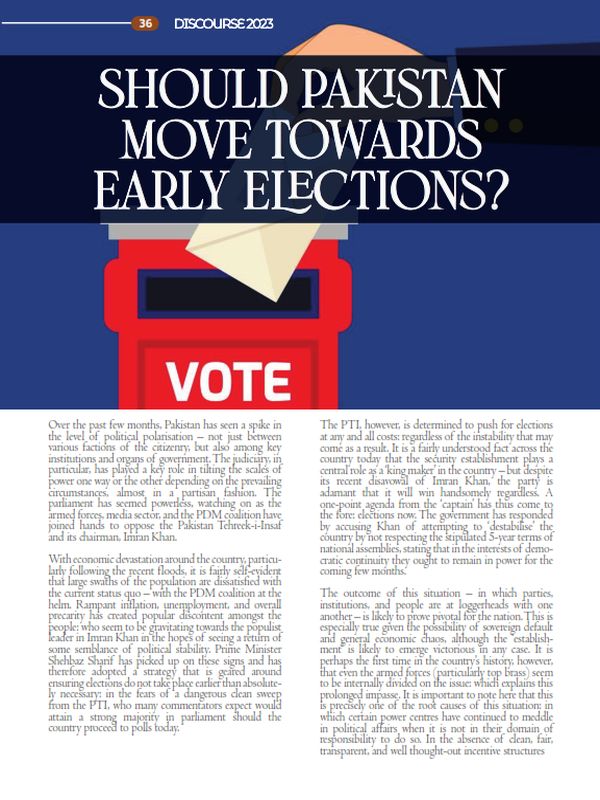Should Pakistan Move Towards Early Elections?
The Debate segment of Discourse seeks to initiate open, good-faith exchanges on ‘big picture’ questions of policy: in particular, ones that involve two consolidated ‘schools of thought’ that have each evolved in apparent isolation and become the antitheses of one another over time. This is due, of course, to ideology and the incentive structures of both media and academia – which are structured to foster the growth of echo chambers. Through this section of the magazine, the Pakistan Institute of Development Economics is attempting to lay out the two salience perspectives of a particular topic in a manner that centres our audience, allowing them to engage with both sides and arrive at their own conclusions.
Over the past few months, Pakistan has seen a spike in the level of political polarisation – not just between various factions of the citizenry, but also among key institutions and organs of government. The judiciary, in particular, has played a key role in tilting the scales of power one way or the other depending on the prevailing circumstances, almost in a partisan fashion. The parliament has seemed powerless, watching on as the armed forces, media sector, and the PDM coalition have joined hands to oppose the Pakistan Tehreek-i-Insaf and its chairman, Imran Khan.
With economic devastation around the country, particularly following the recent floods, it is fairly self-evident that large swaths of the population are dissatisfied with the current status quo – with the PDM coalition at the helm. Rampant inflation, unemployment, and overall precarity has created popular discontent amongst the people: who seem to be gravitating towards the populist leader in Imran Khan in the hopes of seeing a return of some semblance of political stability. Prime Minister Shehbaz Sharif has picked up on these signs and has therefore adopted a strategy that is geared around ensuring elections do not take place earlier than absolutely necessary: in the fears of a dangerous clean sweep from the PTI, who many commentators expect would attain a strong majority in parliament should the country proceed to polls today.
The PTI, however, is determined to push for elections at any and all costs: regardless of the instability that may come as a result. It is a fairly understood fact across the country today that the security establishment plays a central role as a ‘king maker’ in the country – but despite its recent disavowal of Imran Khan, the party is adamant that it will win handsomely regardless. A one-point agenda from the ‘captain’ has thus come to the fore: elections now. The government has responded by accusing Khan of attempting to ‘destabilise’ the country by not respecting the stipulated 5-year terms of national assemblies, stating that in the interests of democratic continuity they ought to remain in power for the coming few months.
The outcome of this situation – in which parties, institutions, and people are at loggerheads with one another – is likely to prove pivotal for the nation. This is especially true given the possibility of sovereign default and general economic chaos, although the ‘establishment’ is likely to emerge victorious in any case. It is perhaps the first time in the country’s history, however, that even the armed forces (particularly top brass) seem to be internally divided on the issue: which explains this prolonged impasse. It is important to note here that this is precisely one of the root causes of this situation: in which certain power centres have continued to meddle in political affairs when it is not in their domain of responsibility to do so. In the absence of clean, fair, transparent, and well thought-out incentive structures around which the political process functions, it is highly likely that the power corridors will continue to be populated by opportunistic ‘leaders’ who are less interested in the people’s concerns than they are about engaging in patronage to line their own pockets. But we digress.
This issue’s debate is centred around whether Pakistan should opt for early elections, with two overarching questions: a) whether there are legal stipulations that could allow for this, and b) if it is even necessary to do so. We are grateful to both our contributors, Ahmed Bilal Mehboob and Waqas Ahmed, who have graciously offered to articulate their strongest arguments for each of the positions. The purpose here is not to add further fuel to polarisation, but to encourage readers to engage with what the ‘other side’ has to say – a key facet of the democratic process across the world, particularly in developed countries.
We hope the debate offers useful information, and encourage you – our lovely audience – to chime in with your thoughts and feelings on the matter. Our social media platforms always welcome healthy, respectful, and fact-based exchange of ideas: regardless of how ‘controversial’ they may be. So hop on!
Remember to keep the discourse alive!
Yours sincerely,
Editorial Board
Discourse Magazine
Pakistan Institute of Development Economics




